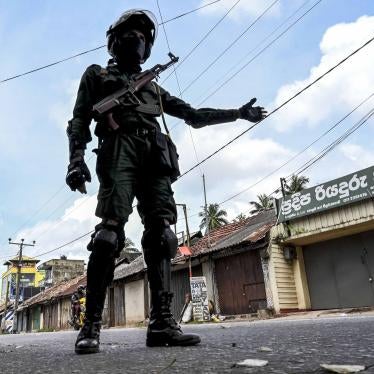(New York) - The Canadian government should carry out a full and public inquiry into the alleged torture of detainees whom Canadian forces transferred to Afghan government custody in 2006-07, Human Rights Watch said today.
Senior Canadian diplomat Richard Colvin, who was based in Afghanistan in 2006-07, told a House of Commons committee last week that persons taken prisoner by Canadian forces in Afghanistan and transferred to Afghan custody during that time period were likely tortured. Colvin testified that he made repeated warnings about detainee abuse. He said that his warnings were at first ignored by senior Canadian government officials, but he was then later instructed to "be quiet and do what we were told."
Under the Convention Against Torture, which Canada ratified in 1987, states are obligated to prevent, investigate, prosecute, and punish its nationals who are complicit or participate in acts of torture. Knowingly transferring persons to a government where they are likely to be tortured may amount to complicity in torture.
"Canadians have a right to know whether their government handed people over to face torture," said Joanne Mariner, terrorism and counterterrorism director at Human Rights Watch. "Richard Colvin's credible and alarming allegations merit a serious investigation."
Human Rights Watch said that Colvin's testimony about torture in Afghanistan is supported by abundant independent evidence. Local and international human rights groups working in Afghanistan have raised concerns about torture and ill treatment by Afghan security forces for years.
In a March 2004 report, Human Rights Watch found that persons in Afghan custody were held "in poor conditions, and some have been subjected to torture and other mistreatment."
In a 2009 report based on information collected in 2006 and 2007, the Afghanistan Independent Human Rights Commission (AIHRC) concluded that "torture and other cruel, inhuman, and degrading treatment are a commonplace practice in the majority of law enforcement institutions." The report described the methods used in Afghanistan as ranging "from punching, kicking, slapping, and humiliation to flogging by cable and electric shock, sometimes leading to a victim's unconsciousness and death."
The human rights record of the National Directorate of Security (NDS), which, along with Afghan National Police, has accepted detainees transferred by Canadian forces, is particularly poor. A successor to the Soviet-era Khadamat-e Etela'at-e Dawlati (KHAD), the NDS is the Afghan government's main intelligence agency. Neither the Afghan government nor international donors, including Canada, have made serious efforts to reform the NDS, despite its long and notorious history of torture and other human rights abuse.
As described in a 2006 letter to NATO's secretary general, Human Rights Watch has found the NDS to be "an opaque, unaccountable, and abusive institution still governed by classified laws promulgated during Afghanistan's communist era." The letter pointed out that the NDS "operates detention centers that fail to meet international standards for the treatment of detainees."
Besides calling for a full investigation into Colvin's allegations, Human Rights Watch criticized Canadian government officials who have aggressively attacked Colvin's credibility and integrity.
"Canadian officials seem to be blaming the messenger rather than addressing the underlying problem of complicity in abuse of detainees," Mariner said. "In doing so, they are harming Canada's reputation as a defender of human rights, and setting a glaringly bad example in the treatment of whistle blowers."
Human Rights Watch also raised concerns that the humane treatment provisions of the Canadian-Afghan memorandum of understanding (MoU) that governs detainee transfers are ineffective. The MoU between the Canadian and Afghan government relies upon the Canadian government to monitor the welfare of detainees it hands over to the Afghan government. However, Canada does not track each individual case, and instead assumes that the AIHRC and International Committee of the Red Cross monitor detainees in Afghan detention facilities, despite being aware that these organizations are not granted unfettered access to all Afghan detention facilities.
"We have seen in other contexts, like Maher Arar's rendition to Syria, that these paper guarantees do nothing to protect prisoners against torture and ill-treatment," said Mariner. "Too often they just serve as a fig leaf, to give the appearance of trying to prevent abuse."






